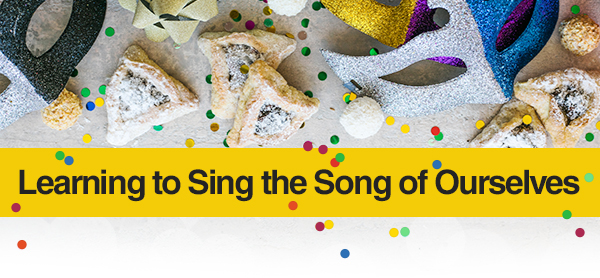
By Rabbi Will Berkovitz, Chief Executive Officer
My daughter and I have been reading one of our favorite books, The Phantom Tollbooth, which tells the story about a bored kid who lacks all curiosity toward the world around him. One of the characters he meets is the Dodecahedron (my son had to help me with pronunciation). This twelve-faced character says, “I have one for smiling…one for frowning, one for pouting and six more besides.” This got me thinking about the holiday of Purim—a holiday about masks, authenticity, and, like virtually every Jewish holiday, survival.
I often think of the faces of those who turn to us and the masks they wear to survive – we all have our masks. Some of those masks we put on ourselves, but there are others that we are forced to wear by those around us – be it society, our families, or our peers. And I am not talking about the masks we are wearing because of the pandemic. I am referring to the sense of being forced into external inauthenticity and the resulting internal conflict and dissonance.
I grew up in a blue-collar family; my mom had a high school degree. So when people would ask if my parents were bankers or lawyers, I didn’t understand the dark shadow behind the question and replied that my dad was an electrician and my mom worked at Target’s bakery. In retrospect, I realize I was being pushed into the role Jews are supposed to play in our society. I suspect many of us who identify as Jewish have experienced some version of the same thing. And some echo of this is true for most minority communities. We know how painful it can be to hear the conversations people have about us when they don’t know we are in the room. It can be even worse when they do.
We call things and people what we choose to call them regardless of what they might choose for themselves – binary is easy, especially when we are the group doing the defining. It is like the way my kids believe in fairness during sibling arguments as long as they are holding the scales of justice.
Simple definitions make things easier than having to deal with the intrinsic complexity and ambiguity in our world and the people around us. And so we force people to wear masks to hide their true selves – to keep them in the neat little boxes we place them in, labeled in big block letters with the black Sharpie we hold: Liberal, Conservative, Christian, Muslim, Black, Jew, white, man, woman, straight, LGBTQ and the list goes on and on. And then we write on the label we have created and put the box on the shelf for later.
One of my favorite names for the Holy One is described at the Burning Bush. When Moses essentially asks, “What is your name?” The reply is, “I Will Be What I Will Be.” The name Moses is told in a future tense verb. It is an extraordinary message. Our ancestors have known this profound reality for thousands of years and we are just starting to catch up. To assign a name or label to a thing is to allow us to possess it, contain it, reduce, and constrain it. But what are we to do with a spork? Is it a spoon or a fork?

What are we to do with our multiplicity, which is at the essence of our very humanity? As Walt Whitman wrote, “Do I contradict myself? / Very well then I contradict myself, / (I am large, I contain multitudes.)” I wonder how different our society would be if we started with, “let us be who we will be.” Let individuals and communities do their own defining. I think it is why one of the other names for the Holy One is simply “HaShem.” Simply translated as “The Name.” It doesn’t allow for definition and confinement. The essence is expansiveness…as is ours.
The great wonder of creation and our humanity is the ability to evolve and break free of the boxes that are inevitably too small to contain us. It is like the Divine light that was too great to be contained in the vessels meant to hold it. Wouldn’t it be a beautiful thing if we allowed each other and our communities to be who they will be – to be vulnerable? To speak honestly. To contradict ourselves. To be expansive. To contain multitudes.
To step out from behind our masks—be they the ones chosen for us, or the ones we choose for ourselves. In doing so, I have no doubt a much greater light would shine forth, driving away the darkness. A light that would allow us to strive for something much more superior to mere survival. A light that would allow us to celebrate the full beauty of the song of ourselves.
In peace,

Rabbi Will Berkovitz
Chief Executive Officer



